
Central American Journey Itinerary
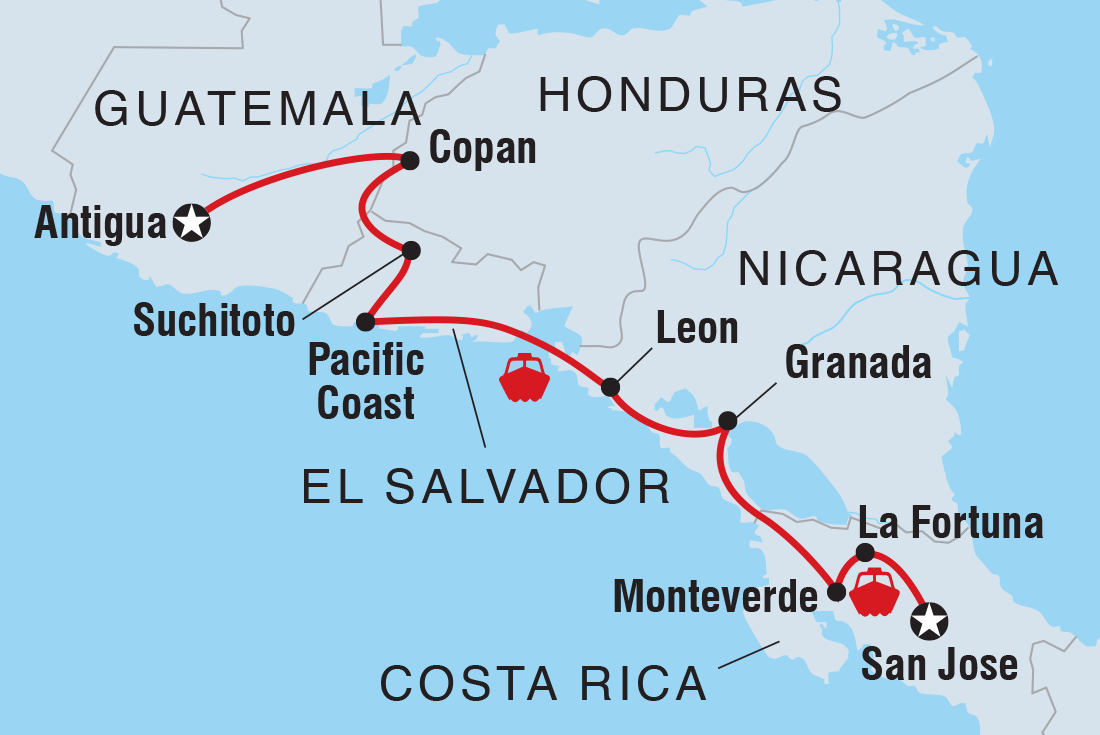


Bienvenidos! Welcome to Guatemala. With crumbling churches, bustling markets and bohemian cafes set against a monumental volcano, Antigua is the perfect place to begin your adventure. Your adventure officially begins with a welcome meeting at 6 pm tonight. If you arrive early, maybe satisfy your cravings and learn the art of old-world chocolate production at the ChocoMuseo or sit by the fountain and people-watch in Central Park. After the meeting, the night is yours – maybe head out with some of your fellow travellers for a tamale (a classic staple of Mesoamerica with dough, meat and sauces steamed and served in a corn husk).
Rise and shine early this morning to beat the rush-hour traffic around Antigua. Departing at about 7 am, you’ll drive towards Copan. Along the way, watch the passing scenery and learn about local life in Guatemala as you head for the border. Cross into Honduras, arriving in the small town of Copan in the early afternoon. While most people use Copan as a base to explore the nearby ruins, there are plenty of other points of interest, both along the cobblestone streets and set into the lush surroundings. Maybe get started in the Central Plaza and follow your nose to a cafe for the afternoon.
This morning, meet up with a local guide and explore the World Heritage-listed ruins of Copan – the southernmost of the great Maya sites. It's unique because of the numerous elaborate stelae (carved columns) still intact among temples, excavated vaults and walls inscribed with ancient faces. After your exploration, the rest of the afternoon is free to choose your own adventure. Maybe check out some fine feathered friends at the Macaw Mountain Park or visit the Temple of Rosalila. You could also head to the nearby natural hot springs - this optional tour gives you hours of soaking in mud, steaming natural baths and refreshing pools in the lush jungle, with an included dinner.
You’ll wave goodbye to Copan this morning and head across the border to Guatemala and into El Salvador. It’s a long travel day, so make sure you’ve got a good book or your favourite road trip games handy. When you arrive in Suchitoto, you’ll head out on a leader-led orientation walk of the town – widely considered the cultural capital of El Salvador. Admire the elaborate building facades, get your bearings and enjoy the surroundings. Then, get your chef’s hat on with a pupusa-making demonstration. Pupusa (cornmeal flatbreads) is a classic Salvadorian recipe from the Pipil culture and is usually stuffed with some delicious ingredients, like cheese or chicharron (fried pork).
This morning, head to a local designer’s home for an indigo-dying demonstration – Suchitoto is one of the best places in the world to produce indigo (used to dye clothing or other items blue). You’ll visit a local designer transforming tradition into modern design to learn the history of the indigo trade. This small enterprise supports single mothers by providing them with an income for their children’s education, food and independence. Watch the demonstration, then get hands-on and try it for yourself. The rest of the day is free in Suchitoto. The town overlooks the Embalse Cerron Grande – also known as Lago Suchitlan, this freshwater lake is a haven for migrating birds, particularly falcons and hawks. Maybe grab a historically-minded group for a guided walk through Cinquera Forest, where guerrilla fighters used the forest as cover during the Civil War.
This morning you’ll drive to the Pacific Coast of El Salvador, home to some amazing dark-sand beaches and some of the best surf spots in the country. You'll have the afternoon free to relax. Maybe find a local restaurant for dinner or simply relax at your accommodation.
Rise nice and early for a full day of travel as you cross the Gulf of Fonseca to reach Nicaragua by boat. In the afternoon you'll reach Leon – the second-largest city in Nicaragua. When you arrive, join your leader on an orientation walk through the charming city streets to get your bearings. Leon is a relatively quiet city, which makes strolling the murals and contemporary architecture a real treat! Tonight, maybe head out to dinner with your group – as always, your leader will have the best recommendations.
Today is a free day to make the most of Leon. Maybe visit the street food area behind the Lady of Grace Cathedral and try a Nica taco (made with maize, the taco is rolled, deep fried and then served with shredded cabbage smothered in cream). You could also take on a thrilling volcano sandboarding adventure on the black slopes of Cerro Negro Volcano. Maybe you’d just like to explore the city’s contemporary art or wander the Leon Cathedral.
This morning, you’ll drive to the oldest city in the New World – Granada. Along the way, you’ll have the chance to stretch your legs and take in the view at Laguna Apoyo – a volcanic crater lake formed around 23,000 years ago. Enjoy some free time for lunch near the viewpoint. Then, stop at the lakeside town of Masaya, where you’ll go on an orientation walk with your leader and get the chance to browse the stalls at the town’s famous artisan market before continuing to Granada. Featuring Moorish and Andalusian architecture, Granada is set on the banks of Lake Nicaragua and is surrounded by active volcanoes. When you arrive, your leader will take you on an orientation walk through the leafy Parque Central and La Calzada – a busy pedestrian street with plenty of bars and restaurants. The afternoon is yours to explore the city at your own pace.
This morning you’ll have breakfast with your group at Cafe de las Sonrisas – a cafe run entirely by people who are hard of hearing. The owner is aiming to bridge the gap and inspire other business owners to employ local people living with disabilities. After, the rest of the day is yours. Maybe hit the Convento y Museo San Francisco and view the collection of indigenous stone statues. Hundreds of evergreen islets dot the waters of vast Lake Nicaragua and you can spend a few hours exploring them by boat or hire a kayak and find your own way around, waving at the fisherman who live in wooden huts along the way. Just remember not to swim, as freshwater sharks live in the water!
Today is another early start as you get ready for a full day of travel. Journey to Monteverde, where you can begin exploring this afternoon on an orientation walk with your leader. Monteverde was founded as an agricultural community in 1951 by a group of North American Quakers. These environmentally aware settlers also established a small wildlife sanctuary, which has since grown into the internationally renowned Monteverde Cloud Forest Biological Preserve. Cloud forests are like rainforests, but instead, draw their water from a semi-permanent cloud covering the region. This is truly a nature lover's paradise! More than 2000 plant species, 320 bird species and 100 mammal species call Monteverde home.
Begin the day with breakfast at a local women’s cooperative cafe. The cafe started with eight women in 1982 and has grown in number over the years, enabling many women without any formal education to generate income for their households without having to leave home, meaning they can continue caring for their children. In store, there are a variety of handmade products – be sure to check them out! The rest of your day is free to explore Monteverde at your own pace. Maybe zoom through the treetops on a ziplining adventure, or for a more relaxed experience, discover Costa Rica's agricultural heritage on a coffee and chocolate tour. Tonight, you’ll have the option to end your day with a night walk through the cloud forest to spot nocturnal creatures in their natural habitat.
This morning, head out to the Monteverde Cloud Forest Reserve, where you’ll join a local guide to walk the reserve trails. As you walk, learn about the fascinating biodiversity of the region, look for the resplendent quetzal and listen for the sounds of howler monkeys. This afternoon, take a minibus to the shores of Lake Arenal, where you’ll then take a boat across the lake to the little town of La Fortuna. On a clear day, you'll have fantastic views of the surrounding area. Watching the massive Arenal Volcano loom larger as you approach is a spectacular sight. Once you reach La Fortuna, take another vehicle to the hotel, then freshen up and head out on a leader-led orientation walk.
Why not start your free day today with a smoothie and plan how you want to explore? Maybe take a guided nature hike through the forest surrounding Arenal Volcano, keeping an eye out for rare plants and animals, or see the forest from a series of hanging bridges that offer a great vantage point for spotting wildlife like sloths and rainbow-coloured birds. The volcano’s inner workings also mean that the area is home to several thermal hot springs – an ideal way to relax in the middle of nature. Or maybe check out the 70 m tall La Fortuna waterfall set in the middle of the rainforest and hit the lake on a stand-up paddleboard. A boat safari in Cano Negro Wildlife Refuge offers the opportunity to see lizards, crocodiles and tropical birds in their natural habitat, so if you’re craving more wildlife, this option is perfect!
Spend your final morning in La Fortuna learning the art of Costa Rican tortillas. A local family will guide you through the process, and you’ll get to try the results over lunch. Then, watch the volcano fade into the distance on your private transfer to Costa Rica's capital – San Jose. When you arrive, head out on an orientation walk with your leader to see the main highlights. When you’ve got your bearings, maybe visit the Gold Museum, which has a fantastic collection of pre-Spanish gold art. If you're in the mood for some shopping, maybe head to the outdoor market in the Plaza de la Cultura or the city's Central Market, where you can buy anything from handicrafts to seafood. Tonight, why not join your fellow travellers for an optional farewell dinner.
With no further activities planned, your trip comes to an end this morning. There's a lot to see and do in and around San Jose, so if you’d like to stay for longer, just speak to your booking agent ahead of time.

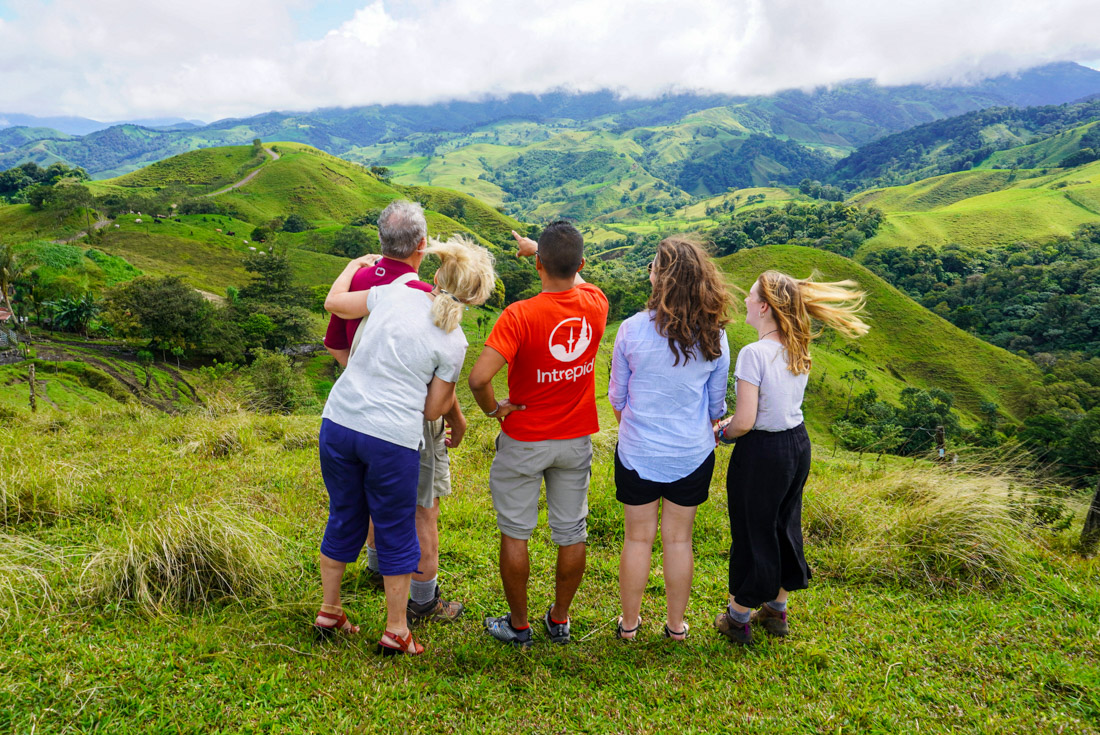
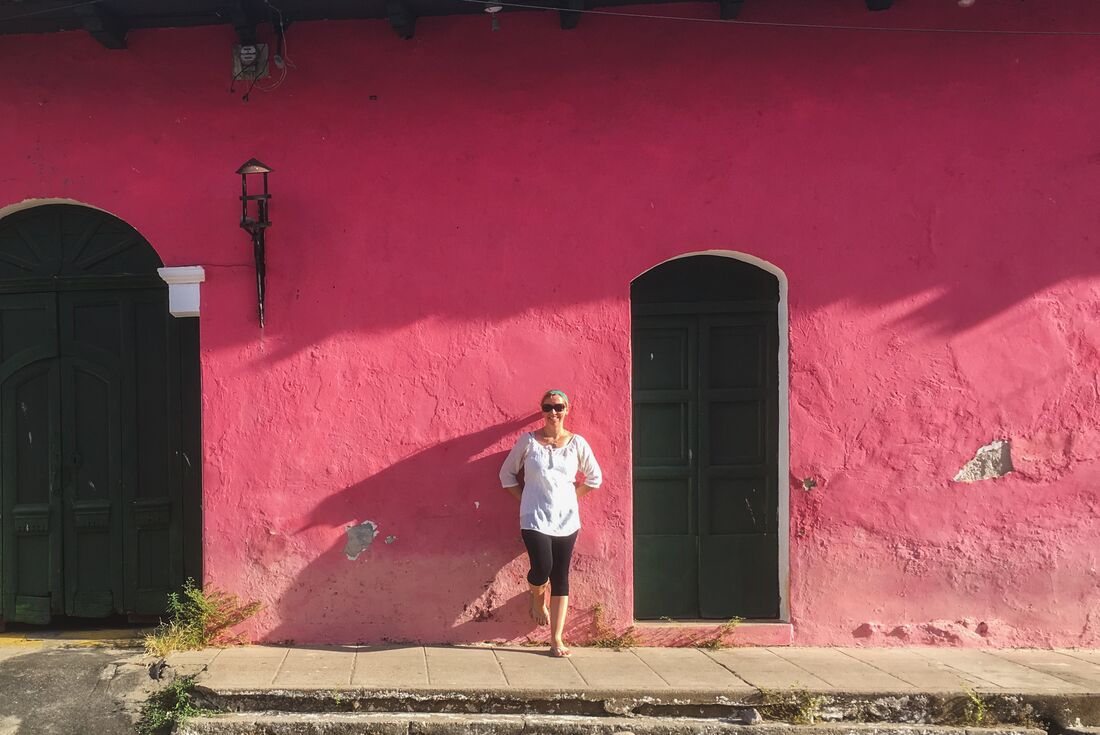
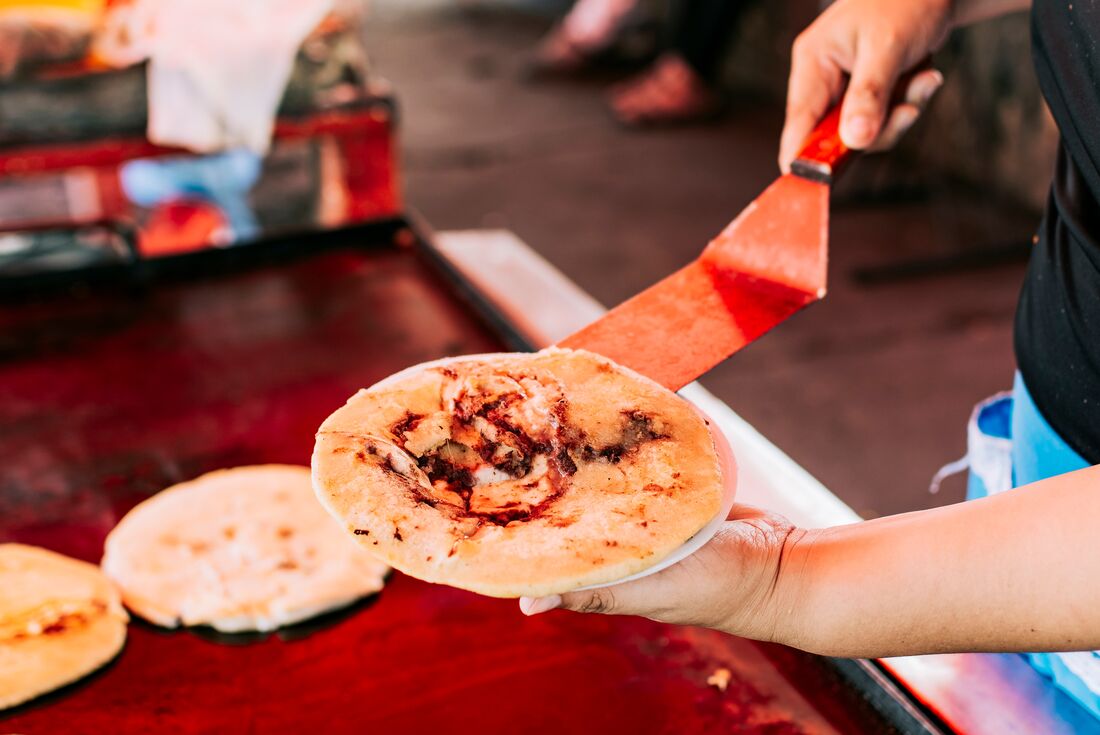
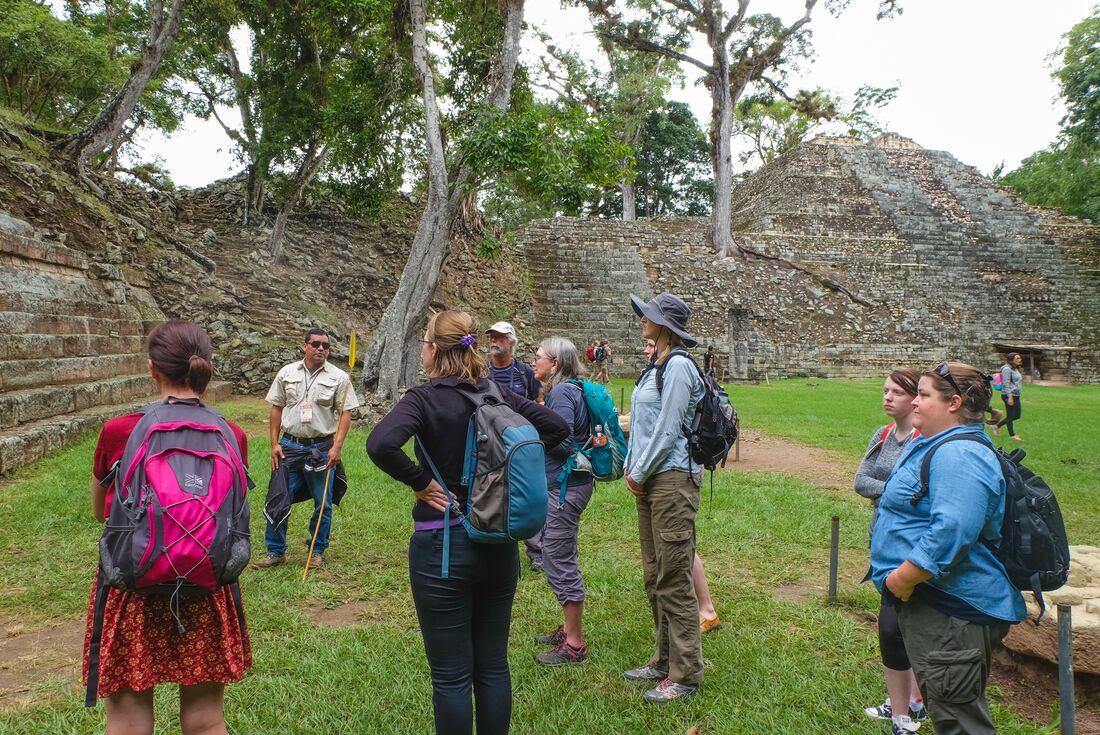
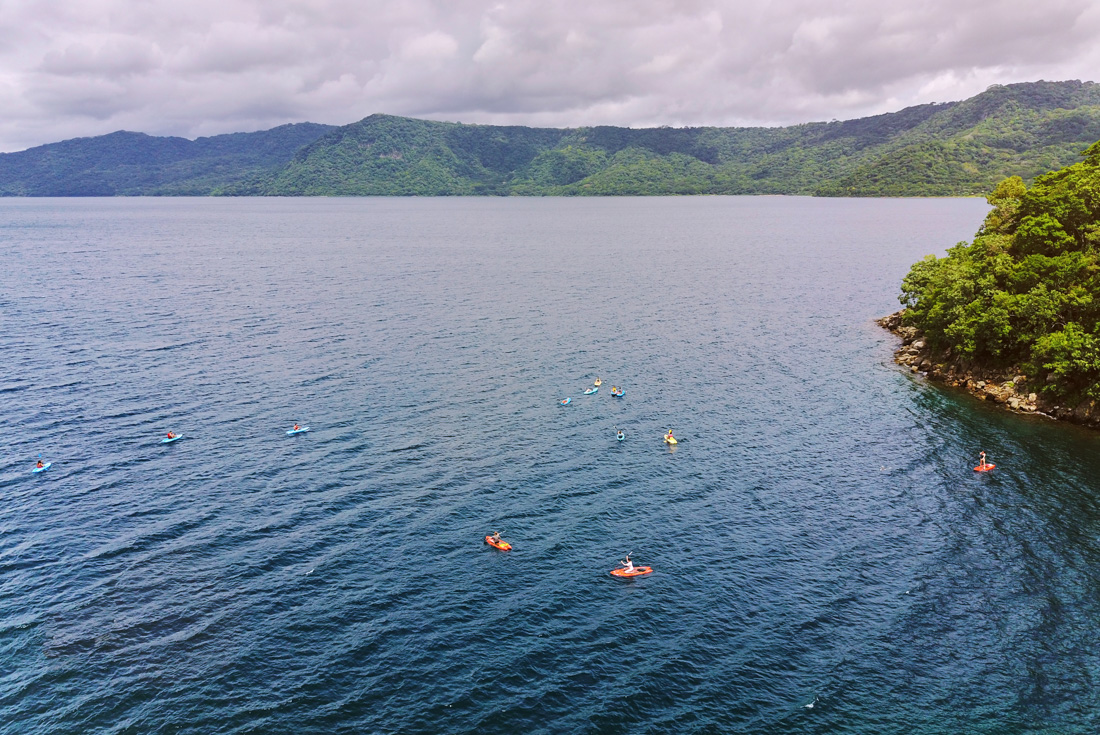
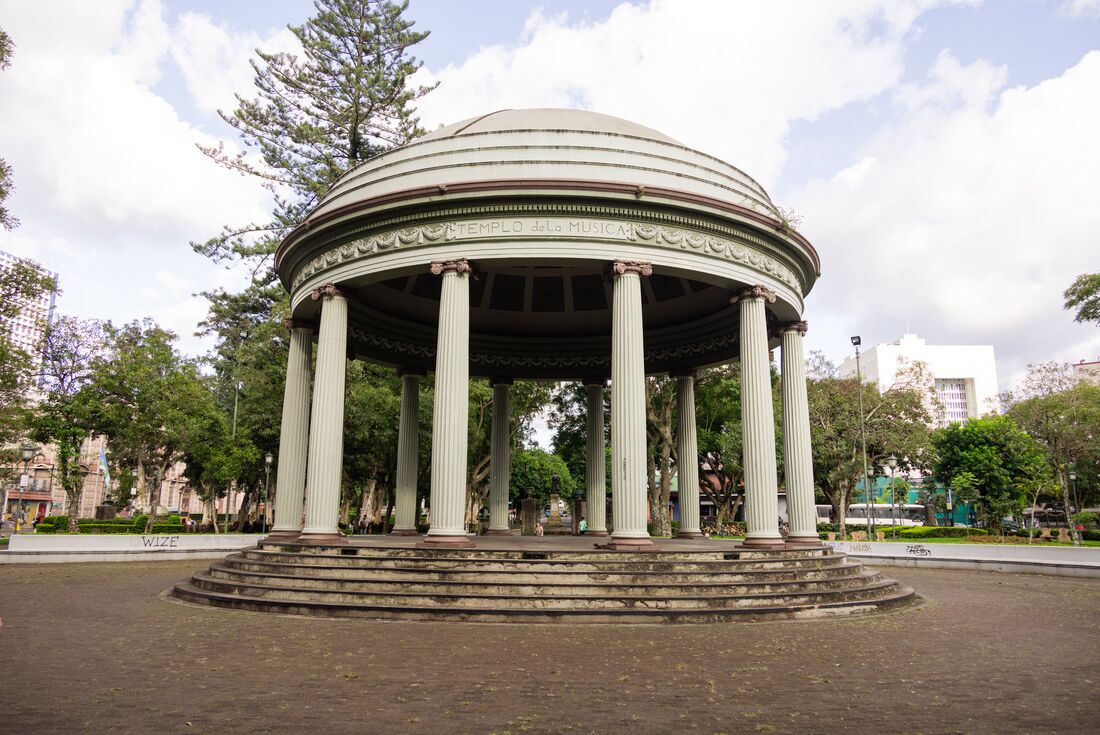

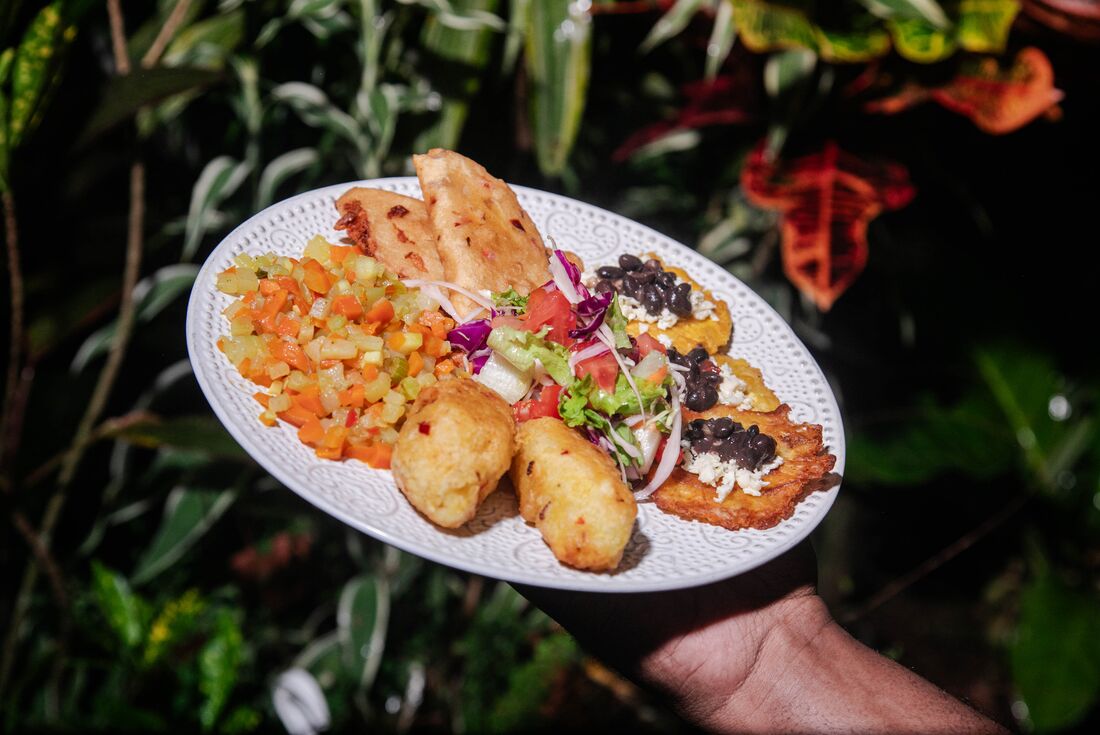
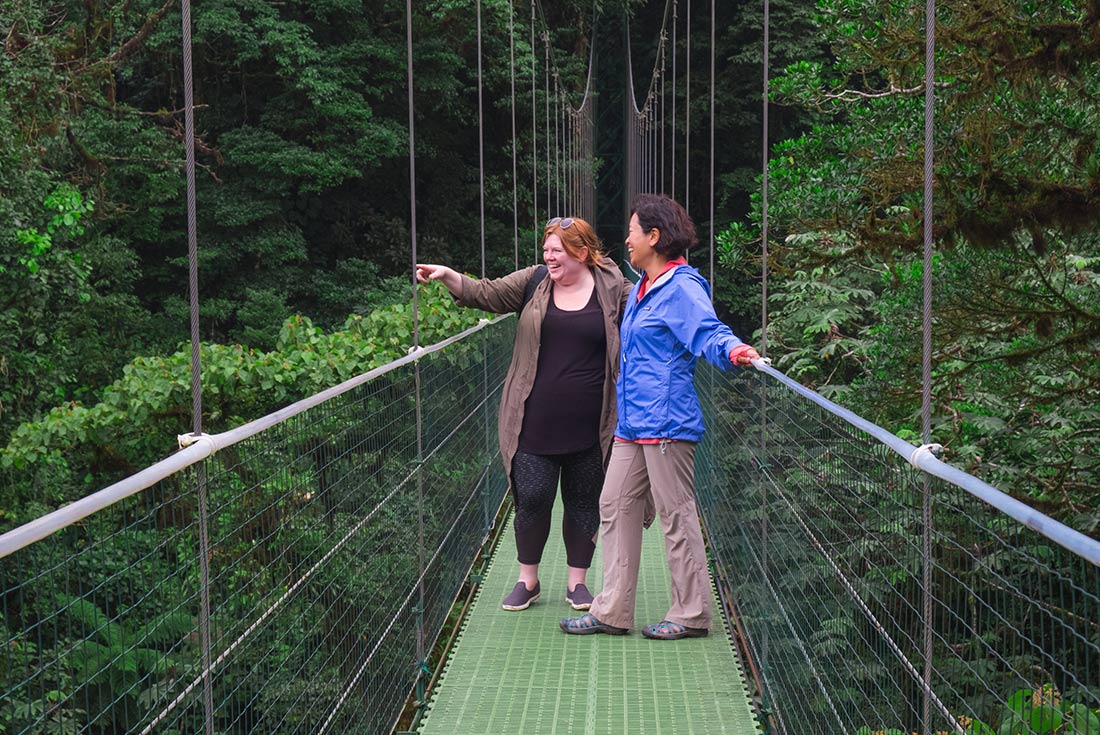
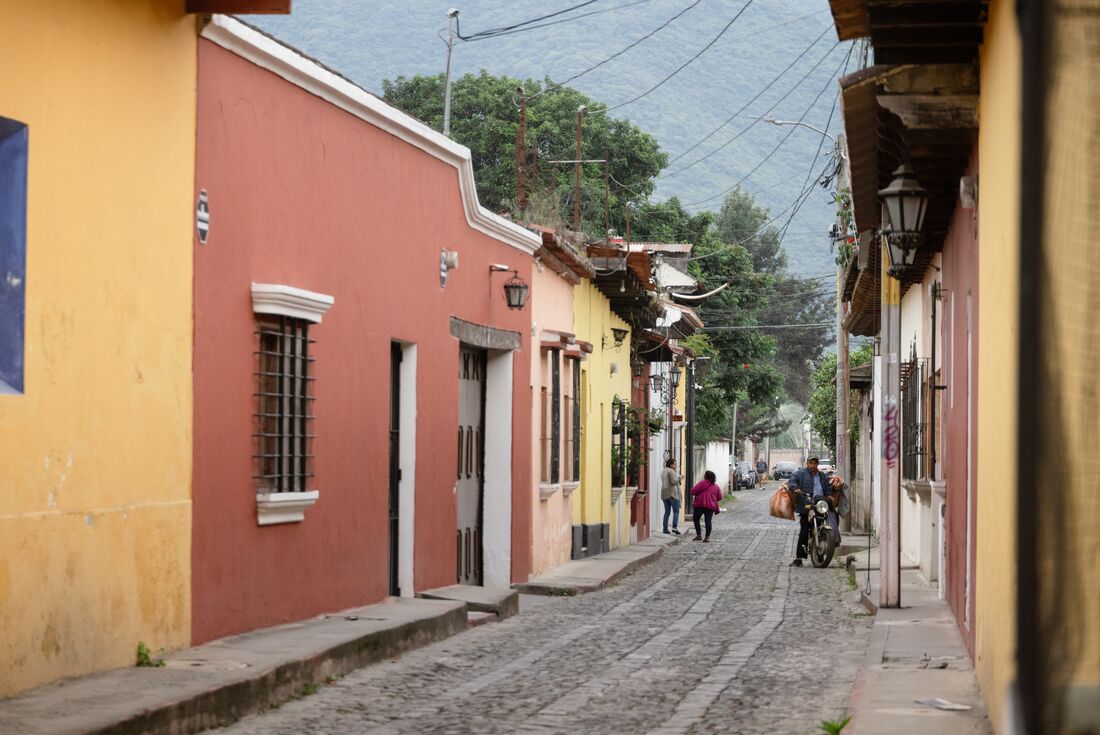
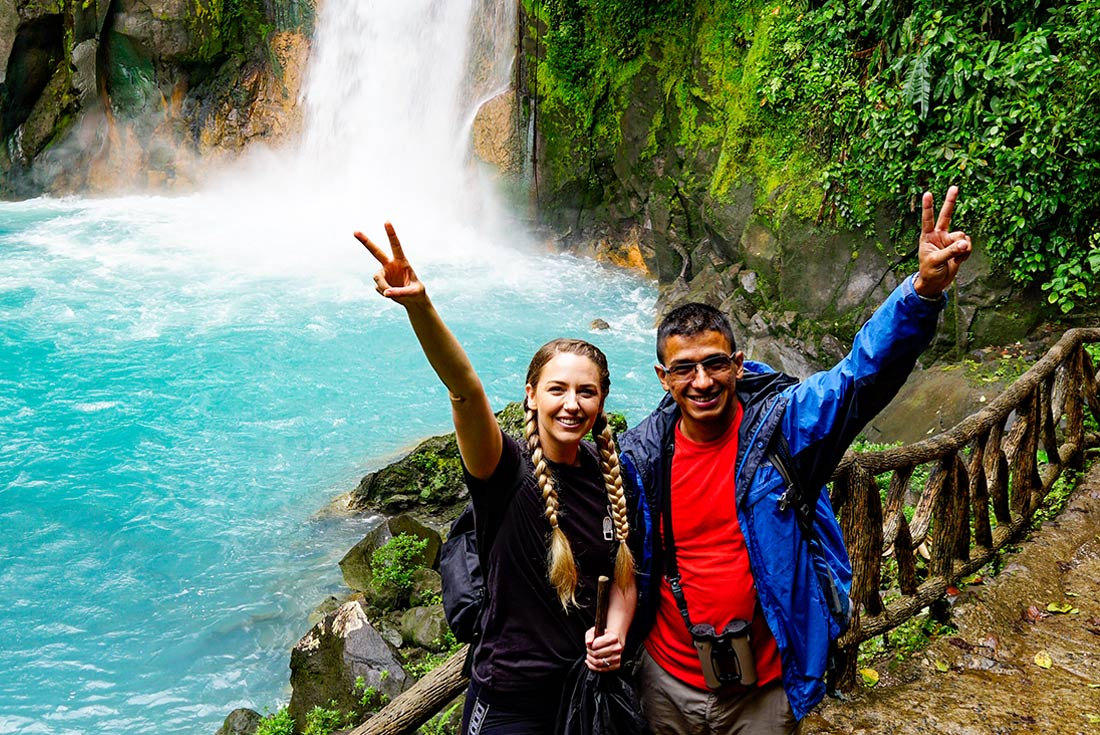
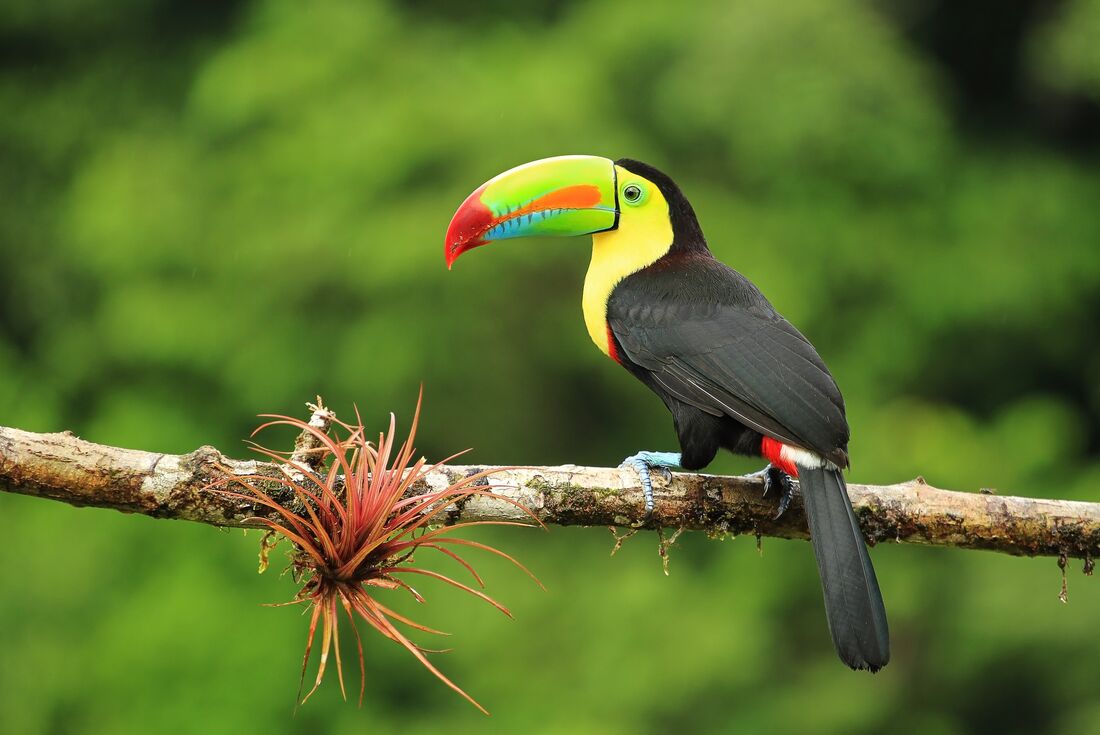
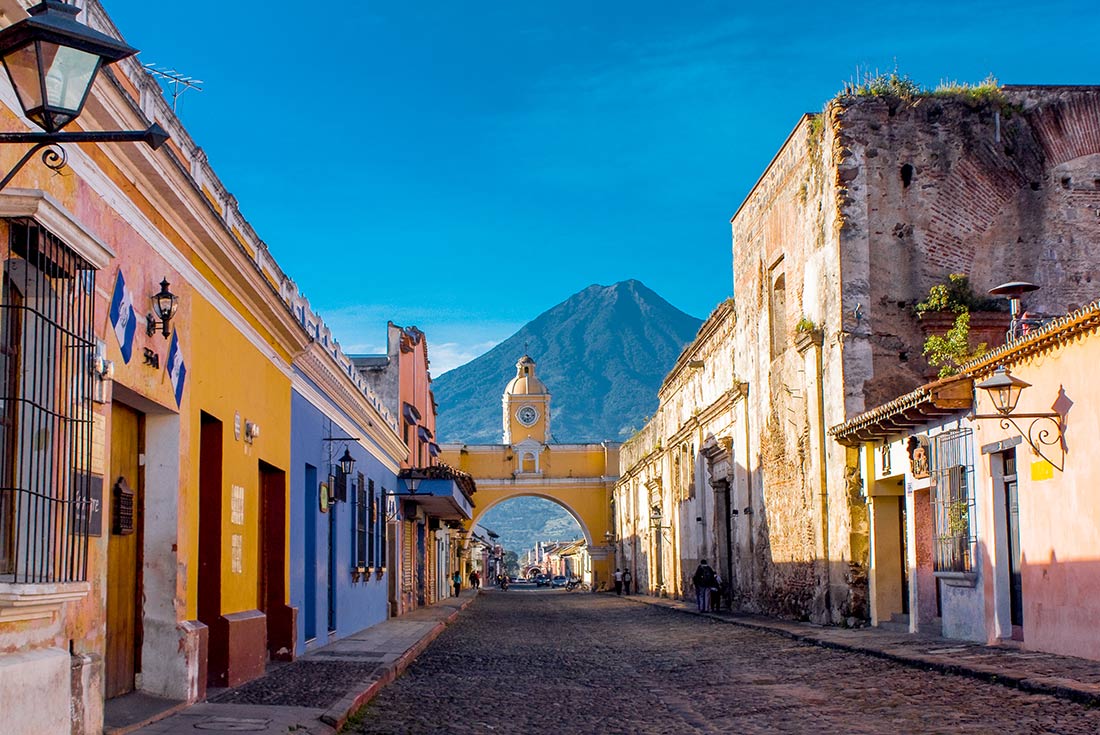

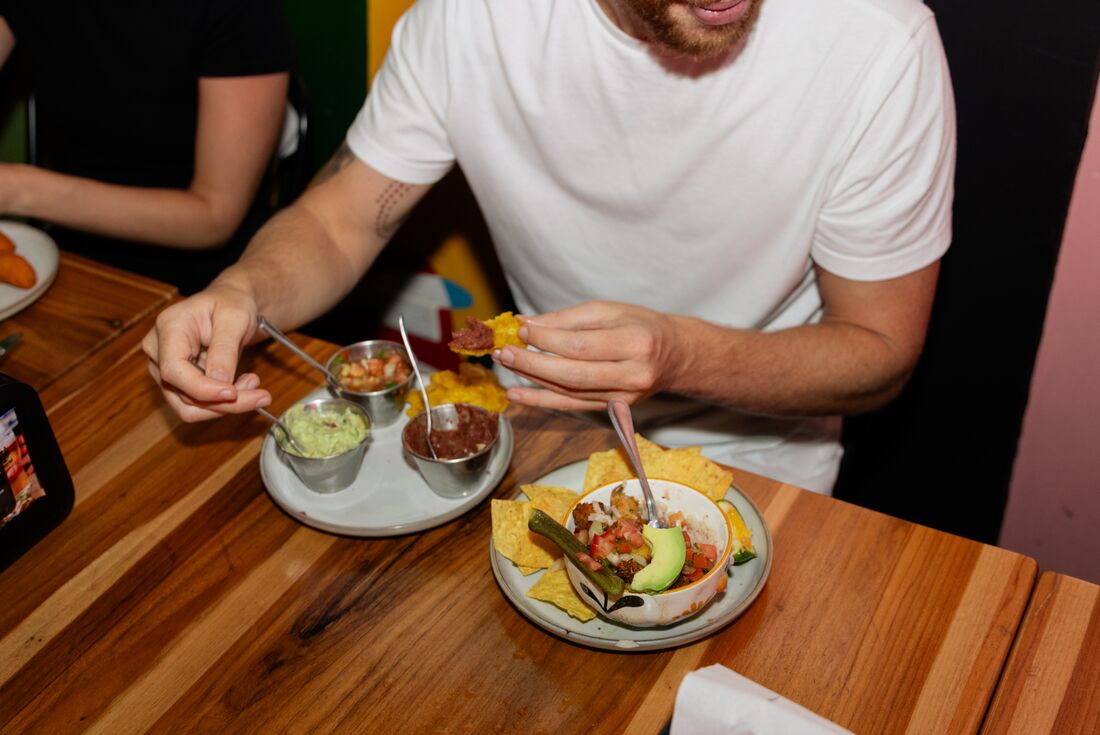
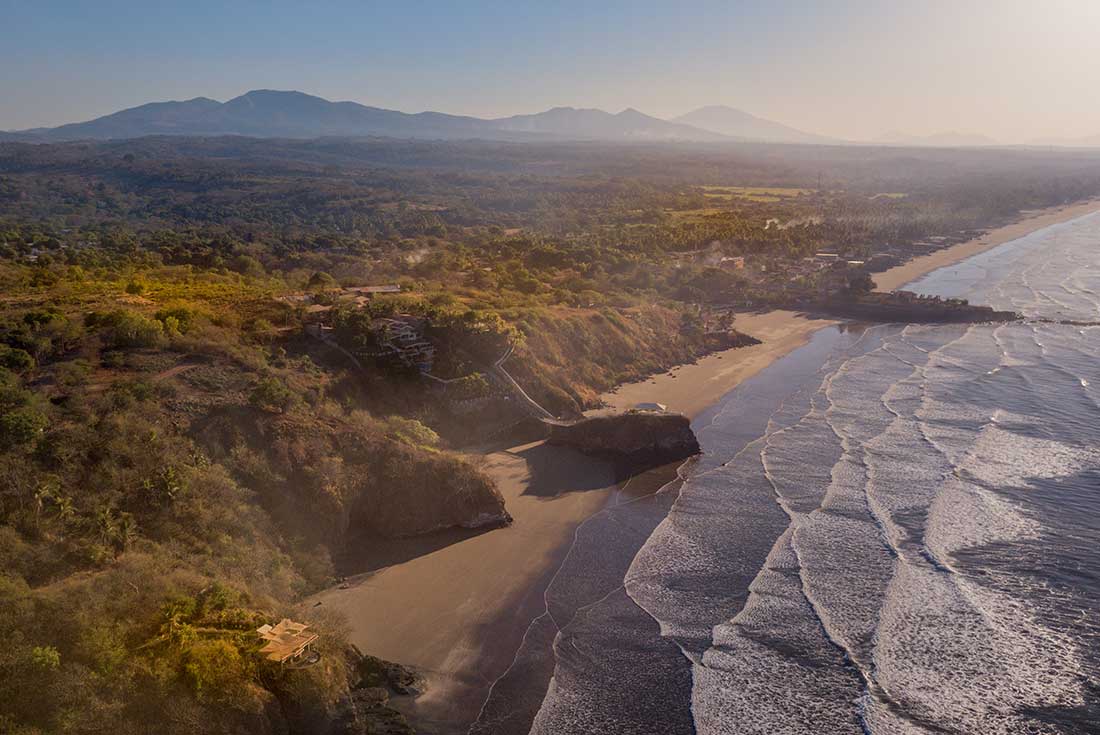
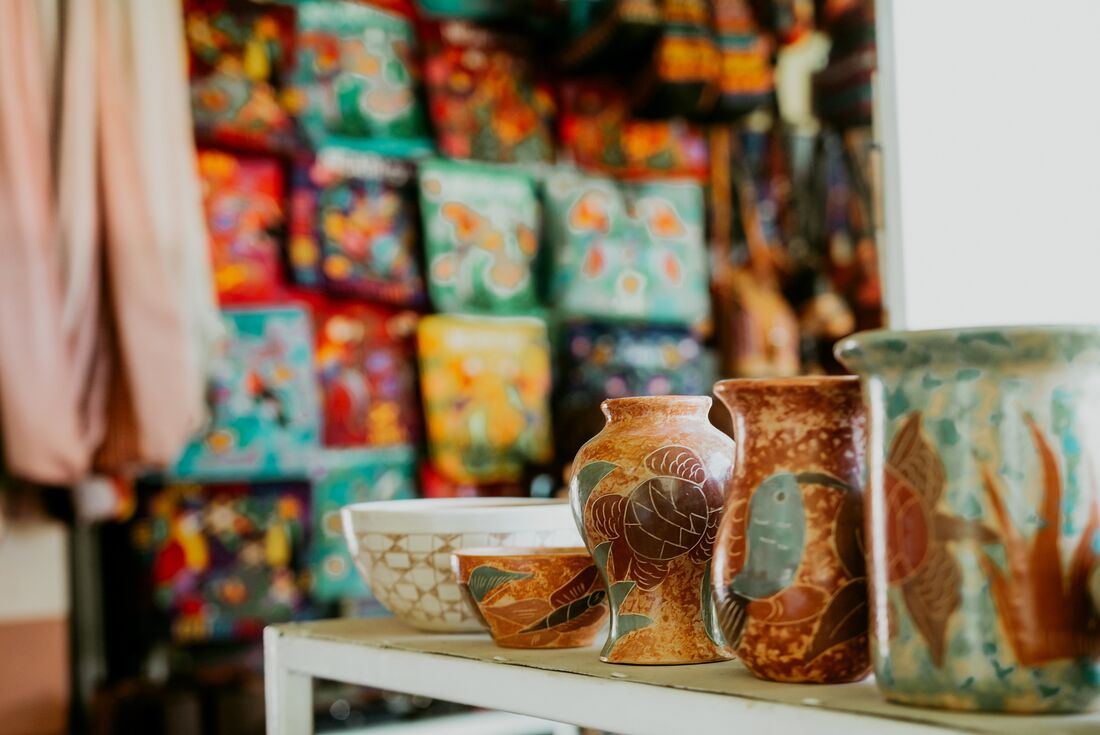
Copan - Guided visit to Archaeological site
Suchitoto - Salvadoran Pupusa cooking demonstration
Suchitoto - Leader led orientation walk
Suchitoto - Indigo Dyeing Demonstration
Leon - Leader led orientation walk
Masaya - Town & Market Visit
Granada - La Laguna de Apoyo Viewpoint
Granada - Breakfast at El Cafe de las Sonrisas
Monteverde - Leader-led orientation walk
Monteverde - Breakfast at women's cooperative cafe
La Fortuna - Leader led orientation walk
Monteverde - Cloud Forest Reserve with a local guide
San Jose - Leader-led orientation walk
La Fortuna - Tortilla Making Class and lunch
Explore varied landscapes of lush Central America. If you’re thinking active volcanoes, historic cities and emerald jungles – this trip has you covered.
Wind your way through the otherworldly ruins of Copan in Honduras, famous for the numerous elaborate stelae. These Maya ruins are a UNESCO World Heritage site and a perfect spot for some great pics.
Watch an indigo-dying demonstration in Suchitoto (the best place to produce indigo in the world!) at a local enterprise that supports working mothers in the community.
Join a local guide (with specialist spotting equipment) on a walk through the steamy cloud forests of Monteverde, searching the lush canopies for the unique Central American wildlife that call this natural haven home.
Try out your Nicaragua sign language skills when you order breakfast at an atmospheric cafe housed in a historic building managed and staffed by members of the local deaf community.
Posada Los Bucaros, #94, 7a North Avenue , Antigua, 03001, GUATEMALA, Phone: +502 78322346
Autentico Hotel, Ave 5 and 7 40 st. , East Sabana,, San Jose, 10108, COSTA RICA, Phone: +506 22225266
1. A single supplement is available if you’d prefer not to share a room on this trip. The single supplement applies to all nights on your trip and is subject to availability. Please speak to your booking agent for further information.
2. Please be careful when booking flights to Antigua; make sure you fly into Guatemala City Airport [GUA]. Guatemala City Airport is the closest airport to Antigua. Please do not book flights to Antigua & Barbuda Airport [ANU] as this is an island in the Caribbean.
3. Please be careful when booking flights from San Jose; make sure you fly out of Juan Santamaría International Airport [SJO]. Please do not book flights from Norman Y. Mineta San Jose International Airport [SJC] as this is located in California, United States.
4.As per updated Nicaragua entry requirements, customers are currently required to supply a copy of their passport front page to their booking agent no later than 15 days prior to departure.
5. Should you have any questions or need assistance with the Honduras pre-registration, your leader will be able to assist on Day 1 of your tour. For more information, visit the ‘Passports, visas and entry requirements’ section of the ‘Essential Trip Information.
6. IMPORTANT FOR UK PASSPORT HOLDERS: You must obtain a multiple entry visa to Honduras before traveling on this trip. Due to reported delays in securing embassy appointments, we recommend checking appointment availability with the Honduran Embassy before confirming your travel plans. See the Passports, visas and entry requirements section in your Essential Trip Information for details.
7. Under Honduran law, travelers under age 21 who are traveling unaccompanied or with only one parent must have written, notarized permission to travel (in Spanish) from the non-traveling parent(s) or guardian(s). Please check with your local embassy or consulate for specific requirements.
8. If you plan to travel with high-quality cameras or binoculars, please reference the packing section of your Essential Trip Information for details about Nicaragua's restrictions and regulations on these items.
While we always endeavour to provide the best possible holiday experience, due to the nature of travel and the areas we visit sometimes things can and do go wrong. Should any issue occur while you are on your trip, it is imperative that you discuss this with your group leader or local representative straight away so that they can do their best to rectify the problem and save any potential negative impact on the rest of your trip.
We recognise that there may be times when your group leader or local representative may not be able to resolve a situation to your satisfaction - if this is the case, please ask the group leader or local representative to speak to their direct manager.
You may also choose to provide details in your online feedback, which we ask you to complete within 30 days of the end of your trip. Please do be aware that it is very difficult for us to provide any practical help after the trip is completed, so informing us while still travelling will give us the opportunity to resolve the issue in real-time., For general contact details please use the following page: https://www.intrepidtravel.com/contact-us, In case of a genuine crisis or emergency, you can reach our local office on the numbers below:
, Intrepid local operator: Available for phone call on +506 4600 6000
Compared to the other countries you visit on this trip, Costa Rica can sometimes seem expensive. Expect to pay more than you would in other Central American countries for a lot of things., You cover heaps of ground on this trip, with several border crossings and long travel days. This trip includes time spent travelling in a private vehicle with your group. Extra space can be tight, and conditions may feel a little cramped. Although this can be tiresome, it’s all part of the adventure and a great way to get to know your fellow travellers., Central America is generally hot and humid year-round. At nighttime and in locations at higher elevations it can get chilly. Protect yourself from the sun, bring light clothing you can layer and a waterproof jacket, and stay hydrated. Air conditioning may not always be available in your rooms. Occasionally, properties may require an additional charge for air conditioning., This trip can involve a lot of walking. Please ensure you bring sturdy walking shoes and comfortable clothes. To make the most of the trip, it's best if you have at least a moderate level of fitness., There will be times when you have to walk with your luggage, and for this reason, it is recommended you pack light and use a backpack or something easy to carry., If you are traveling with a UK passport, a visa is now required to enter Honduras. Please ensure you check the Important Notes and Essential Trip Information for more details.
Explore varied landscapes of lush Central America. If you’re thinking active volcanoes, historic cities and emerald jungles – this trip has you covered., Wind your way through the otherworldly ruins of Copan in Honduras, famous for the numerous elaborate stelae. These Maya ruins are a UNESCO World Heritage site and a perfect spot for some great pics., Watch an indigo-dying demonstration in Suchitoto (the best place to produce indigo in the world!) at a local enterprise that supports working mothers in the community., Join a local guide (with specialist spotting equipment) on a walk through the steamy cloud forests of Monteverde, searching the lush canopies for the unique Central American wildlife that call this natural haven home., Try out your Nicaragua sign language skills when you order breakfast at an atmospheric cafe housed in a historic building managed and staffed by members of the local deaf community.
All group trips are accompanied by one of our group leader or local representative. The aim of the group leader or local representative is to take the hassle out of your travels and to help you have the best trip possible. Intrepid endeavours to provide the services of an experienced group leader or local representative however, due to the seasonality of travel, rare situations may arise where your group leader or local representative is new to a particular region or training other group leader or local representative.
Your group leader or local representative will provide information on the places you are travelling through, offer suggestions for things to do and see, recommend great local eating venues and introduce you to our local friends. While not being guides in the traditional sense, you can expect them to have a broad general knowledge of the places visited on the trip, including historical, cultural, religious, and social aspects. At Intrepid we aim to support local guides who have specialised knowledge of the regions we visit. If you are interested in delving deeper into the local culture at a specific site or location then your group leader or local representative can recommend a local guide service in most of the main destinations of your trip.
TRAVEL ADVISORIES & ALERTS
We recommend that you check your government's foreign travel advisory for the latest information about the destination before you travel. You will also need to ensure that your travel insurance covers you for all destinations and activities on your trip. We also recommend saving the phone number for emergency consular assistance for your government’s consulate in the destination/s you’ll be travelling. Links to travel advisories and any current travel alerts for our trips can be found here: https://www.intrepidtravel.com/travel-alerts
PERSONAL SAFETY
Ensure you have a secure method of carrying your passport, phone, credit cards and cash while travelling such as a money belt. Leave all other high value items, including jewellery, at home Use safety deposit boxes at hotels to store your valuables when available and ensure your luggage is lockable. Be aware of the risk of pick-pocketing and petty theft. Exercise caution when walking at night, don’t walk alone and stick to well-lit streets wherever possible. Be vigilant on public transport and look out for your fellow travellers. Take precautions such as carrying your bag in front of you and never leaving personal items unattended.
LGBTQIA+ TRAVELLERS
Intrepid welcomes all LGBTQIA+ customers on our trips, however we operate in parts of the world that are less accepting. We support LGBTQIA+ customers to travel to these destinations and are committed to ensuring they face no discrimination on any part of the trip we control. We recommend you visit Equaldex (https://www.equaldex.com/) and your government's foreign travel advice for LGBTQIA+ travellers when choosing your trip., https://www.intrepidtravel.com/safety-guidelines, PETTY THEFT AND PERSONAL SAFETY
While travelling there is always the risk of pick-pocketing and petty theft, particularly in the more touristy cities. We recommend that you exercise caution when walking alone at night and encourage you to walk together and only on main, well-lit thoroughfares. Be particularly vigilant on public transport. Simple measures like carrying your day pack on your front, not hanging your bag over the back of your chair or on the floor and wearing a money belt will reduce any chance that your valuables should go missing., MONEY WITHDRAWAL:
In order to avoid fraud and theft, it is advisable that you withdraw money from ATMs located inside banks or guarded shops during business hours only., LOCAL LODGINGS:
On this trip you will be staying in some restored houses and local lodges - these are one of the charms of this journey, but their staircases, balconies and passages etc may not always comply with western safety standards. Please do not expect elevators in these properties as they are preserved to their original state., FIRE PRECAUTIONS
Local laws governing tourism facilities in this region may differ from those in your home country and accommodation we use may not have a fire exit, fire extinguishers or smoke alarms., SEAT BELTS:
Please be aware that local laws governing transportation safety may differ from those in your home country and not all the transport which we use is able to provide seat belts., WATER SAFETY:
Please take care when taking part in any activities in the ocean, river or open water, where waves and currents can be unpredictable. It's expected that anyone taking part in water activities is able to swim and have experience in open water. All swimmers should seek local advice before entering the water.
PASSPORT
You’ll need a valid passport to travel internationally and most countries require your passport to have a minimum of 6 months validity, so remember to check the expiry date.
We need your passport information to get everything ready for your trip so it’s important that the information on your booking matches your passport exactly. Please take care to provide the correct details. We recommend carrying a copy of the photo page of your passport while travelling and leaving a copy at home with family or friends.
VISAS & ENTRY REQUIREMENTS
Many countries require a visa and obtaining the correct visa for your trip and any countries you may transit through is your responsibility. We recommend you check your visa requirements as soon as you have booked your trip. This will ensure you have time to prepare your documents and for your visa application to be processed. You can check the entry requirements for your nationality on your government's foreign travel advisories, consular websites or on our page here: www.intrepidtravel.com/visa-entry-requirements, ENTRY AND EXIT FEES
You may be required to pay a fee when entering or exiting a country, particularly if travelling via a land border crossing. Your leader will assist you with the process at the border. Having small bills in USD to pay fees in exact change will expedite the process.
The below country-specific information was correct at the time of writing; however, please visit the relevant consular websites of the countries you’re visiting for up-to-date information., GUATEMALA, EL SALVADOR, HONDURAS, NICARAGUA: CA-4 Border Agreement
The CA-4 is a border control agreement between four Central American countries: El Salvador, Guatemala, Honduras, and Nicaragua. This agreement allows for easier movement between these nations, similar to the European Schengen Area.
Your initial entry starts a single 90-day timer for all four countries combined. When entering any CA-4 country, tell immigration officials your total planned stay across all CA-4 countries, not just the country you're entering. This time limit cannot be reset by crossing borders between CA-4 countries.
Special info for UK passport holders and permanent residents: If you will be traveling to or transiting through Honduras during your trip, you must obtain a visa for Honduras from a Honduran embassy prior to your travel. Visas for UK citizens and permanent residents entering Honduras are not granted at the border. Due to potential delays in securing embassy appointments, check appointment availability before confirming your travel plans.
If you were born in the United Kingdom but are traveling with a passport from a country that does not currently require a visa to visit or transit through Honduras, you may still need a visa due to your country of birth. Please check with your local embassy or consulate for specific requirements.
, HONDURAS VISA REQUIREMENTS - UK CITIZENS & PERMANENT RESIDENTS
Visa requirements for UK citizens and permanent residents travelling to Honduras have recently changed. Please follow the link above for more information., HONDURAS VISA APPLICATIONS FOR UK PASSPORT HOLDERS & PERMANENT RESIDENTS
You will be provided with a Hotel List in a Visa Support Letter to assist you in applying for your visa. This is the primary document you should use to apply for your visa as they are issued by our local office in Costa Rica.
If you will be crossing into Honduras more than once during your trip, you will need to apply for a multiple entry visa. Please check your itinerary and Important Notes carefully.
Intrepid recommends that you apply for your Honduras visa as early as possible as there are reports that it can take up to 60 days to receive an appointment with the Honduran embassy.
Hotel List - this will be sent to you by Intrepid or your travel agent at the time of booking. If you do not receive this, email us with your booking number and trip details. Please note this hotel list is indicative of the hotels used on trip only, subject to changes. Please refer to your booking confirmation and the Essential Trip Information for the actual joining and finishing hotels of the trip.
, TRAVELERS UNDER THE AGE OF 21 ENTERING OR TRANSITING THROUGH HONDURAS
Under Honduran law, travelers under age 21 who are traveling unaccompanied or with only one parent must have written, notarized permission to travel (in Spanish) from the non-traveling parent(s) or guardian(s). Please check with your local embassy or consulate for specific requirements.
, HONDURAS
If you enter Honduras overland, there is a US$3 entry processing fee., EL SALVADOR
If you enter El Salvador overland, you are required to purchase a Tourist Card for USD 12. If you exit El Salvador overland, there is a USD 0.50 departure tax., NICARAGUA
Travellers are required to supply a copy of their passport bio page to their booking agent no later than 15 days prior to departure.
Travellers who by profession are human rights or political activists, journalists, academics or members of the clergy may be denied entry to Nicaragua at the border. We advise all travellers to verify whether they can meet Nicaragua's entry requirements prior to travel by contacting their local consulate or embassy.
If you enter Nicaragua by air, you must purchase a Tourist Card for USD 10. If you enter Nicaragua overland, you must pay a USD 3 processing fee in addition to the Tourist Card fee.
If you exit Nicaragua overland, there is a USD 4 departure tax. If you exit by air, a departure tax of USD 35 is normally included in the cost of your ticket.
High quality binoculars and photography equipment (especially cameras with long zoom lenses) are restricted in Nicaragua and may be subject to inspection or seizure by the Nicaraguan customs authorities. Please refer to the Packing section for more information., COSTA RICA
There is no entry fee. If you exit Costa Rica overland, there is a US$9 departure tax. If you exit Costa Rica by air, departure tax typically included in the cost of your ticket.
Information not available.
Validity: 04 Feb 2026 to 31 Dec 2026
GENERAL HEALTH
All travellers need to be in good physical health in order to participate fully on this trip. For the safety and wellbeing of yourself and others, if you are unwell prior to travelling, please stay at home and contact us to make alternative arrangements.
When selecting your trip please make sure you have read through the itinerary carefully and assess your ability to manage and enjoy our style of travel. Please note that if in the assessment of our group leader or local representative a traveller is unable to complete the itinerary without undue risk to themselves and/or the rest of the group, we reserve the right to exclude them from all or part of a trip without refund.
You should consult your doctor for up-to-date medical travel information or for any necessary vaccinations before departure. We recommend that you carry a first aid kit as well as any personal medical requirements in their original packaging as they may not easily be obtained while travelling. If you are carrying medication, ensure you check your government's foreign travel advice for any local restrictions or requirements.
, ZIKA VIRUS:
There have been reports of transmission of the mosquito-borne Zika virus in this region and we advise all travellers to protect themselves from mosquito bites. Given possible transmission of the disease to unborn babies, and taking a very cautious approach, we recommend all women who are pregnant or trying to get pregnant to consult with their doctors before booking their trip., MALARIA:
There is no commercially available vaccination against malaria, which is transmitted by mosquito bites and is a risk in many less-developed tropical areas in Africa, Latin America and South East Asia. Protection against mosquito bites is essential and where the risk is considered high, anti-malarial medications are recommended. Anti-malarial medications should be discussed with experts as there are different medications available and not all medications suit all people or all destinations. Where malaria is considered prevalent in mountainous regions we prefer that trekkers to altitude try to avoid the use of mefloquine (Lariam) if possible., DENGUE FEVER:
Dengue Fever is common in Latin America and can occur throughout the year. Argentina, Bolivia, Uruguay, Brazil, and parts of Mexico are currently suffering from a serious outbreak. This virus is transmitted by mosquitoes. There is no vaccination against it, but there are preventative measures that you can take such as wearing long clothing, using repellent, and being indoors particularly around dusk and dawn., YELLOW FEVER
A valid international certificate of vaccination against Yellow Fever is required in many countries. You may need to present this on arrival at the airport or border crossing. Some countries will refuse entry if you are unable to present your certificate. It's also quite common for your home country to request a Yellow Fever certificate on your arrival back home. It is your responsibility to check with your doctor well in advance of leaving home about the Yellow Fever requirements for the countries you'll be visiting.
, ENTERING NICARAGUA VIA LAND BORDERS
Travelers entering Nicaragua via land borders should be aware of recent reports that border agents may ask for proof of Yellow Fever vaccination, even if arriving from a country without known Yellow Fever risk. Refusal of entry and/or requests for cash fees may occur if you do not carry proof of vaccination, which your leader cannot control.
While travelling with us you'll experience the vast array of wonderful food available in this region. Your group leader or local representative will be able to suggest restaurants to try during your trip. To give you the maximum flexibility in deciding where, what and with whom to eat, generally not all meals are included in the trip price. This also gives you more budgeting flexibility. As a rule, our groups tend to eat dinner together to enable you to taste a larger variety of dishes and enjoy each other's company. There's no obligation to do this though.
DIETARY REQUIREMENTS
Please let us know your diet requirements before your trip starts.
Generally speaking, in bigger cities/towns vegetarians can expect a reasonable range of vegetarian venues and/or vegetarian options within tourist restaurant menus. However, vegetarianism is not the norm in this part of the world so options can be limited when eating at homestays, small local restaurants, street stalls, markets, etc.
More restrictive diet requirements (vegans, coeliac, gluten intolerance, fructose intolerance, lactose intolerance, etc.) can also be accommodated along this trip but you should expect a lesser variety than what you can expect at home. We recommend that, if possible, to bring your own supply of snacks with you.
For those on strict Kosher or Halal diets, we understand your dietary requirements are important, however, sometimes due to cultural and language differences these are not always easy to convey when you are travelling. Your guide will do their best to assist you in translating your needs when eating out, but please be aware that these diets are almost unheard of in much of the continent and the best they may be able to accommodate is no pork and shellfish. If this will be a concern for you you may need to consider opting for vegetarian or vegan meals for the included meals in your itinerary. We recommend researching kosher or halal options in your destination country prior to travel to see if you are able to buy snacks once there, otherwise consider bringing some from home.
SPENDING MONEY
When it comes to spending money on the trip, every traveller is a little different. You know your spending habits better than we do, so please budget an appropriate amount for things like optional meals, drinks, shopping, optional activities, and laundry. Make sure you have read the itinerary and inclusions thoroughly so you know what is included in the trip price and what you may need to pay for while travelling. , GUATEMALA
The official currencies of Guatemala are the Quetzal (GTQ) and the US dollar (USD). ATMs are not always reliable although you can pay with major credit and debit cards at many hotels, restaurants and stores. Banks offer currency exchange but currency exchange offices are usually quicker and may offer better rates. USD is the only currency freely exchanged in Guatemala., HONDURAS
The official currency of Honduras is the Honduran Lempira (HNL). ATMs are not widely available in Honduras and tend to only be inside banks, which means they’re inaccessible outside business hours. You can pay with major credit and debit cards at many hotels, restaurants and stores. USD is the only currency freely exchanged in Honduras., EL SALVADOR
The official currency of El Salvador is the US Dollar (USD). ATMs are widely available but not always reliable. You can pay with major credit and debit cards at many hotels, restaurants and stores., NICARAGUA
The official currency of Nicaragua is the Nicaraguan gold córdoba (NIO). USD cash is widely accepted, but for smaller items NIO is cheaper and easier. ATMs are available and NIO can be withdrawn. NIO isn’t exchangeable outside the country, so withdraw carefully and spend before departing. You can pay with major credit and debit cards at many hotels, restaurants and stores., COSTA RICA
The official currency of Costa Rica is the Costa Rican Colón (CRC). ATMs are available and CRC can be withdrawn. USD cash (small bills) is widely accepted, but not for taxi fares. You can pay with major credit and debit cards at many hotels, restaurants and stores., MEALS NOT INCLUDED
For this trip we recommend USD 25 to USD 50 per day., TIPPING
Tipping can be an appropriate way to recognise great service when travelling. While it may not be customary in your home country, it is an entrenched feature of the tourism industry across many of our destinations and is greatly appreciated by the people who take care of you during your travels. It is always best to avoid tipping with coins, very small denomination notes, or dirty and ripped notes, as this can be regarded as an insult rather than the goodwill gesture it is intended to be., We recommend budgeting approximately USD 85 per person to tip drivers and service providers for activities included in this trip. This doesn’t include a tip for your leader., YOUR GROUP LEADER OR LOCAL REPRESENTATIVE
Tipping your group leader or local representative is highly appreciated if you feel they’ve provided outstanding services throughout your trip. The amount is entirely a personal preference; however, as a guideline, the recommended amount is 4-7 USD or EUR per traveller per day (in a currency relevant to your destination). Of course, you are free to tip more or less as you see fit, depending on your perception of service quality and the length and involvement of your group leader or local representative on your trip., CONTINGENCY FUNDS
We try to plan for every eventuality, but there are still some things beyond our control. We reserve the right to change an itinerary after departure due to local circumstances or a Force Majeure Event. In such emergency circumstances, the additional cost of any necessary itinerary alterations will be covered by you. Please note we are not responsible for any incidental expenses that may be incurred as a result of the change of itineraries including but not limited to visas, vaccinations or non-refundable flights. Make sure you have access to an extra US$500 for emergencies (e.g. severe weather, natural disasters, civil unrest) or other events that result in unavoidable changes to the itinerary (e.g. transport strikes or cancellations, airport closures). Sometimes these things necessitate last-minute changes to enable our trips to continue to run, and as a result, there may be some extra costs involved. The recommended amount is listed in USD for the relatability of universal travellers, however, local currency may be needed once in the country to cover these costs.
Most travellers prefer to take a small to medium wheeled suitcase, which is a great size for the packing capacity in our private vehicles. You will need to be able to carry your own luggage, handle it at airports, take in/out of accommodation and perhaps even walk short distances. We recommend you pack as lightly as possible.
You'll need to bring a day pack/bag for activities and day trips.
In terms of weight, airlines generally allow a maximum of 15-20kg for check in luggage and a maximum of 5kg for carry on. Check with your airline for baggage allowances.
Other than the items and clothing you always need on a trip, below we have listed packing suggestions specific for this trip:
ESSENTIAL:
- Sun protection – sunhat, sunglasses, sunscreen (reef-safe sunscreen for swimming). The UV index can be very high in this region, therefore it is essential you protect yourself adequately from the sun.
- Clothing for hot and humid weather: Lightweight, breathable quick-drying clothing.
- Clothing for cool nights/high altitudes, rainy days, and to protect against bugs: A lightweight waterproof jacket, pants, clothing you can easily layer.
- Closed-in walking/hiking shoes. Closed-in shoes will help to protect your feet from mud, cuts and scratches and bug bites.
- Personal travel documents which may include a passport, visa, driver's license, travel insurance, flight tickets and your Essential Trip Information. Photocopies of these documents stored separately from the originals will be handy. While not valid, a photocopy of your identification makes it much easier to obtain replacements if necessary.
RECOMMENDED:
- Water bottle. We recommend at least a 1.5 litre capacity. Clean, filtered water is available for free in many hotel lobbies. The sale of bottled water contributes to an enormous environmental problem around the world. In addition to the water in bottles, the production of a 1 litre plastic bottle takes 2 litres of water and 200ml of oil. A large proportion end up in limited landfill or discarded in waterways and natural environments
-Electrical adapter plug (Central American countries use plug types A & B which are standard throughout North America)
-Personal medical kit. Your guide will carry a large kit but we recommend you carry items such as mild pain killers, electrolyte powders and Band-Aids.
-Watch/Alarm clock or phone that can be used for both
-Swimwear
-Travel beach towel
-Water-proof bag for your phone
-Tissues &/or toilet paper &/or wet wipes
-Insect repellent
-Camera with a spare memory card, charger &/or batteries
OPTIONAL:
-Earplugs to guard against a potential snoring room-mate
-Phrasebook
VALUABLES:
Please try to avoid bringing unnecessary valuables, and use your safe if available. It’s also a good idea to purchase a money belt or pouch that is easily hidden.
LAUNDRY:
Laundry is available at many hotels and towns during this trip, although you might need to wait for a two-night stop in order to make sure you get it back in time. While laundry at hotels is usually charged by the item, laundromats usually charge by the kilo, which is generally inexpensive (about USD 2 per kilo)., NICARAGUA - RESTRICTIONS ON CAMERA EQUIPMENT
Nicaragua enforces strict regulations regarding professional-grade camera equipment. High-quality DSLR/SLR cameras with long zoom lenses are often flagged at the border even if they are not "professional grade". Videography equipment, large high-power binoculars, and night-vision binoculars are also restricted. We recommend you leave your high-quality cameras with zoom lenses at home. If you do choose to travel with photography equipment, carrying receipts may help demonstrate that items were purchased for personal rather than professional or commercial use, though we cannot guarantee this will prevent complications at the border. Drones of any kind are banned in Nicaragua.
NICARAGUA - RESTRICTIONS ON PRINTED READING MATERIAL
Nicaragua may confiscate any physical printed reading material such as books, newspapers and magazines at the border.
Please note that Hurricane season is June to November, when landslides, mudslides, flooding and disruptions to essential services can occur. Intrepid monitors these situations as they may arise, so that itineraries or activities can be amended as necessary.
Intrepid won't tolerate any kind of violence, harassment (whether physical, verbal or sexual), or disrespect toward fellow travellers, our teams or local communities.
To ensure the wellbeing of everyone on the trip, decisions made by your group leader are final.
Romantic relationships between travellers and group leader or local representative are not permitted while on trip.
Any behaviour that prevents your leader from continuing the itinerary as planned, breaks local laws or opposes any of these guidelines may result in Intrepid denying your booking or removing you from the trip.
If something concerns you during your travels, please speak to your group leader immediately. Alternatively, you can contact us on the emergency contact number detailed in the Problems and Emergency Contact Information section of this Essential Trip Information.
The style of accommodation indicated in the day-to-day itinerary is a guideline only and may change. On some occasions, alternative arrangements may need to be made due to the lack of availability of rooms in our preferred accommodation. In these cases, we will use a similar standard of accommodation.
Throughout the trip, we request that our properties prepare rooms in time for our arrival, especially if we're arriving prior to normal check-in time. However, this isn't always possible which means we won't be able to check-in immediately on arrival at some hotels. Instead, we can store our luggage and explore our new destination or on some trips, have use of shared day rooms until all rooms are available.
Information not available.
Travel insurance is compulsory on all our trips for those travelling internationally. We require that, at a minimum, you are covered for medical expenses, including emergency repatriation. If you are travelling within your home country or region, please confirm before travel that you are entitled to access the public medical system easily should an accident occur. We strongly recommend all travellers have a policy that also covers personal liability, cancellation, curtailment and loss of luggage or personal effects. For international trips, you will not be permitted to join the group until evidence of travel insurance and the insurance company's 24-hour emergency contact number has been sighted by your group leader or local representative.
If you have credit card insurance, your group leader or local representative will require details of the participating insurer/underwriter, the level of coverage, policy number, and emergency contact number, rather than the bank's name and your credit card details. Please contact your bank for these details prior to arriving in-country.
For travellers who reside within the European Union, Switzerland or the USA, the requirement to purchase travel insurance cannot be compulsory. However, the purchase of travel insurance is still highly recommended, and each country you visit may have its own specific entry requirements. For example, some mandate travel health insurance for all foreign travellers, regardless of their nationality. Travellers from the European Union, Switzerland or the USA who decline travel insurance when travelling outside their home region must sign a Travel Insurance Waiver Form at the Group Meeting, recognizing personal responsibility for emergency medical and repatriation costs should they arise.
For assistance with travel insurance or other services, please visit the link below:
, https://www.intrepidtravel.com/booking-resources/our-services
As you travel on a group trip you will be exposed to all the pleasures and maybe some of the frustrations of travelling in a group. Your fellow travellers will probably come from all corners of the world and likely a range of age groups too. We ask you to be understanding of the various needs and preferences of your group - patience with your fellow travellers is sometimes required for the benefit of everyone's travel experience. Remember too that you have responsibilities to the group. If you are requested to be at a place at a certain time, ensure that you don't keep the rest of the group waiting. We have found time and time again that the very best trips we operate are those where the dynamics within the group work well - this takes just a little effort on your part. Due to privacy reasons, we are unable to provide you with contact details and any personal information about your fellow travellers booked on your trip prior to departure., SOLO TRAVELLERS
On our trips, rooming is organised on a twin-share basis. We pair up solo travellers with another traveller of the same gender, as per the gender marker on each of their passports.
We also offer an optional single supplement on most trips for travellers who prefer to have their own room. This only applies to accommodation during the tour. Pre-trip and post-trip accommodation booked through us will always be on a single-room basis.
On a small selection of trips some accommodation will be open-gender and multishare, such as a felucca in Egypt or an overnight train in Vietnam. Please review the Accommodation section of the Essential Trip Information for details about your trip.
LGBTQIA+ TRAVELLERS
We strive to create a safe and inclusive environment for everyone. If your gender identity differs from what is indicated on your passport, please contact us so that we can discuss rooming options with you.
ITINERARY CHANGES
Our itineraries are updated regularly throughout the year based on customer feedback and to reflect the current situation in each destination. The information included in this Essential Trip Information may therefore differ from when you first booked your trip. It's important that you review this information prior to travel so that you have the latest updates. Due to weather, local conditions, transport schedules, public holidays, political unrest or other factors, further changes may be necessary to your itinerary once in-country. Your group leader or local representative will keep you up to date with any such changes once your trip is underway and has the authority to amend or cancel any part of the trip itinerary if deemed necessary due to safety concerns.
, OPTIONAL ACTIVITIES
A selection of optional activities that have been popular with past travellers are listed in the day-to-day itinerary. This isn't an exhaustive list and should be used as a guide only for some of what might be available. Prices are approximate, are for entrance fees only, and don’t include transport to and from the sites or local guides unless indicated. All activities are subject to availability, and maybe on a join-in basis. It may not be possible to do all the activities listed in the time available at each destination, so some pre-planning for what you are most interested in is advised. When it's recommended that travellers pre-book these activities, look for a note in the Special Information section of the day-to-day itinerary. For most, they can either be organised independently on the day, or let your group leader or local representative know you are interested at the Welcome Meeting and they can assist.
Where activities are considered medium or high risk, we work with operators whose safety and credentials we have sighted and assessed. Although it is possible that you may find the same activity cheaper with another operator on the ground, we cannot vouch for the safety or quality of that operator. Medium and high-risk activities not listed above have not been assessed by us and as such our staff and group leader or local representative are unable to assist you with organising these activities. Activities that contravene our Responsible Travel policies are also not listed. Please remember that the decision to partake in any activity not listed is at your own discretion and risk.